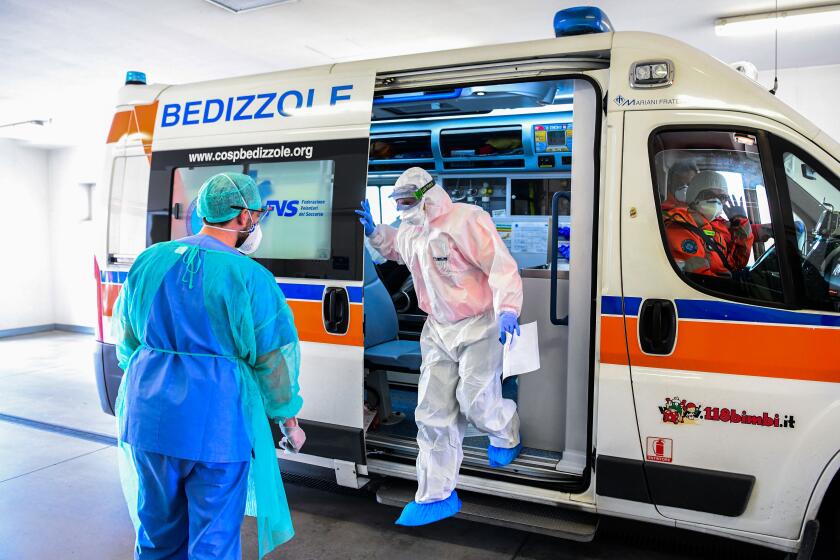Universal’s coronavirus movie strategy: A short term fix, or a sign of change?
Universal Pictures’ decision to rapidly accelerate the home video release of its theatrical movies during the coronavirus crisis is likely a relief to housebound families, now that movie theaters are mostly shuttered.
The Comcast Corp.-owned studio is making “The Hunt,” “Emma” and “The Invisible Man” available for digital rental as soon as Friday. The DreamWorks Animation sequel “Trolls World Tour” will be released through online retail services on the same day as its scheduled April 10 theatrical release.
Immediately, questions about the larger industry implications began circulating.
Which studios would follow Universal’s lead in breaking the traditional theatrical window, in which multiplexes have exclusive access to new movies for an average of about 90 days before they’re released for home viewing?
The latest updates from our reporters in California and around the world
On Tuesday, the AT&T Inc.-owned Warner Bros. said its DC antihero movie, “Birds of Prey and the Fantabulous Emancipation of One Harley Quinn,” will be released for digital purchase March 24. That’s 6 1/2 weeks after the Margot Robbie film’s Feb. 7 theatrical debut.
“Birds of Prey” director Cathy Yan cheered the Burbank-based studio’s decision on Twitter.
“Thanks to all the fans and supporters out there. I’m just happy people will be able to enjoy new and fun movies right now,” Yan wrote.
Another major question persists. Is Universal’s bold move a temporary fix to cope with the lack of out-of-home entertainment options as American social life comes to a virtual standstill? Or is it foreshadowing a future in which Hollywood studios bring certain movies to consumers digitally much sooner than they previously would have?
After all, studios have long wanted to collapse the theatrical window in response to changing consumer demand. Universal is owned by cable giant Comcast Corp., which would benefit from being able to deliver movies directly to subscribers more quickly.
However, theater owners have long resisted any attempts to break with established windowing practices, arguing that shortening the timeline would destroy their business.
“We expect when [theaters] resume operations, they will hold a strong position that this was a ‘once in a lifetime’ reaction to a very specific situation, and will not again be repeated,” Bernstein media analyst Todd Juenger said in a research report. “But the toothpaste will be out of the tube.”
The National Assn. of Theatre Owners on Tuesday downplayed the possible ramifications. The Washington, D.C.-based trade group said business will rebound when theaters reopen. For major films, the group also noted, studios rely on robust theatrical releases to make a profit.
“To avoid catastrophic losses to the studios, these titles must have the fullest possible theatrical release around the world,” the group said. “It is our understanding from discussions with distributors that the vast majority of deferred releases will be rescheduled for theatrical release as life returns to normal.”
When life can return to normal remains an open question. AMC Theatres and Regal Cinemas on Monday said they would close all U.S. locations in response to federal government guidance against public gatherings of more than 10 people. AMC, which has 630 U.S. theaters, will be closed for six to 12 weeks, the company said.
The situation has hammered the exhibition industry, which employs 150,000 people (many of whom are part-time or hourly), according to the theater owners association.
Leawood, Kan.-based AMC’s stock has plummeted 23% so far this week to $2.48.
Movie theaters were previously able to boycott films when studios wanted to experiment with early online releases, as they did with Universal’s “Tower Heist” in 2011.
Several years ago, studios tried to negotiate for a shorter window of roughly 45 days for some titles. Studios proposed charging viewers $30 to $50 for early home video rentals and sharing some of that revenue with theaters, but the discussions fizzled.
Last year, streaming giant Netflix tried to negotiate a truncated window for Martin Scorsese’s “The Irishman,” but the sides couldn’t reach an agreement. Netflix refused to give theaters exclusivity for more than 45 days, according to people familiar with the matter who were not authorized to comment.
During the pandemic, studios will be able to test how much money they can make from early releases of certain titles. Universal is charging $19.99 to rent its movies for 48 hours, for example. That may seem high for a digital rental, but it’s significantly lower than the cost of taking a family to the movies.
Armed with data they never had before, studios could emerge from the crisis in a better position to negotiate terms with the major theater chains, said one longtime film distribution executive who has dealt with on-demand platforms.
“This is the first time studios can actually test this on movies, and the exhibitors can’t do anything about it, because they’re closed,” said the executive, who requested anonymity to protect industry relationships. “On the other side of this, they’re going to have data that shows how many people sitting at home are going to pay $20 for a 48-hour window.”
Of course, that data will be skewed by the fact that customers have little else to do while bars, restaurants and other recreational places are closed in many parts of the country. Televised sports have also been postponed.
“The pandemic certainly gives the studios cover for this grand experiment that they’ve long wanted to make,” said San Diego-based analyst Peter Csathy, founder of consultancy Creatv Media. “But the results of the experiment will be predetermined, because there’s no alternative and we’re so desperate for content. It’s an experiment born out of practical necessity.”
Some analysts are skeptical that Universal’s rentals will generate hefty sales.
“We don’t believe a meaningful number of households would choose to pay $20 for a ‘current’ movie, versus the vast library available at no marginal cost on Netflix, Disney+, etc.,” Juenger wrote.
Still, the information should help studios identify which films might work financially under a new model.
Few people think big-budget franchise films will go the early video on-demand route. They can’t afford to. That’s partly why Universal Pictures delayed the global release of its latest “Fast & Furious” movie, “F9,” by nearly a year rather than putting it directly on iTunes, Amazon and Vudu.
Many of the films getting released online soon have relatively low budgets. “The Invisible Man,” made by Blumhouse Productions, cost $7 million to make and has grossed $123 million at the box office. “The Hunt,” also a low-budget Blumhouse effort, opened with a lackluster $5.3 million last weekend as the coronavirus situation escalated.
The Walt Disney Co. is in a holding pattern with “Mulan,” an epic live-action remake of the 1998 animated classic that was expected to debut March 27. The film has been delayed indefinitely due to the coronavirus.
Disney on Tuesday said May that titles including the Marvel film “Black Widow,” Armando Iannucci’s “The Personal History of David Copperfield” and the psychological thriller “The Woman in the Window” would move to “future potential dates to be determined.”
Burbank-based Disney, which has been the biggest beneficiary of the theatrical model, has not said whether it will pursue early VOD releases.
Still, in a notable shift, Disney did move up the Disney+ debut of “Frozen 2” last weekend, putting the animated musical on the streaming service three months earlier than expected.
The move gave families something fresh to watch during the crisis. It also gave parents a reason to subscribe to Disney+, which costs $6.99 a month, if they haven’t already. With the coronavirus eliminating communal experiences from daily life, that’s a lot more time (and money) for people to spend on the couch.
As for the future of the cinematic experience, the theater owner association expressed optimism amid the dread.
“No one can precisely predict when public life will return to normal, but it will return,” the association said. “The social nature of human beings — the thing that exposes us to contagion, and that makes it so difficult to change behavior in response to pandemic threats — is also the thing that gives us confidence in the future.”
Times Staff Writer Meg James contributed to this report
More to Read
Inside the business of entertainment
The Wide Shot brings you news, analysis and insights on everything from streaming wars to production — and what it all means for the future.
You may occasionally receive promotional content from the Los Angeles Times.












